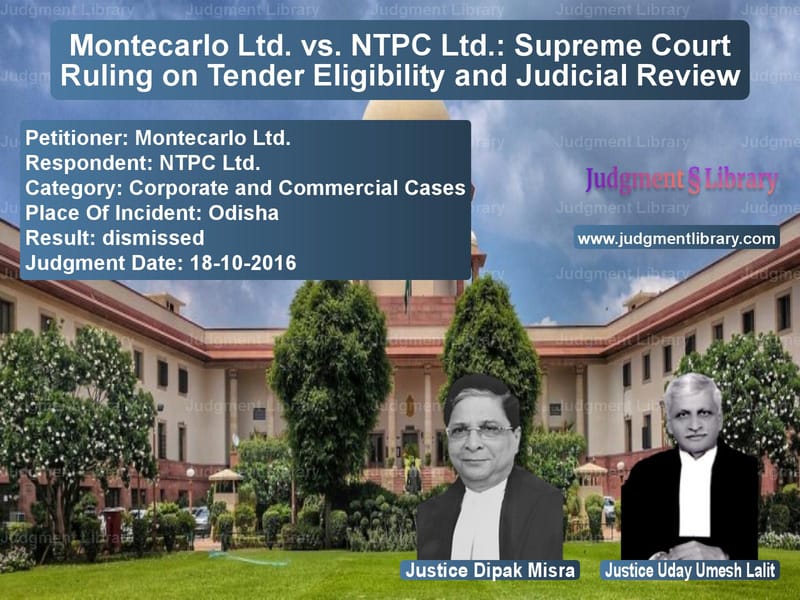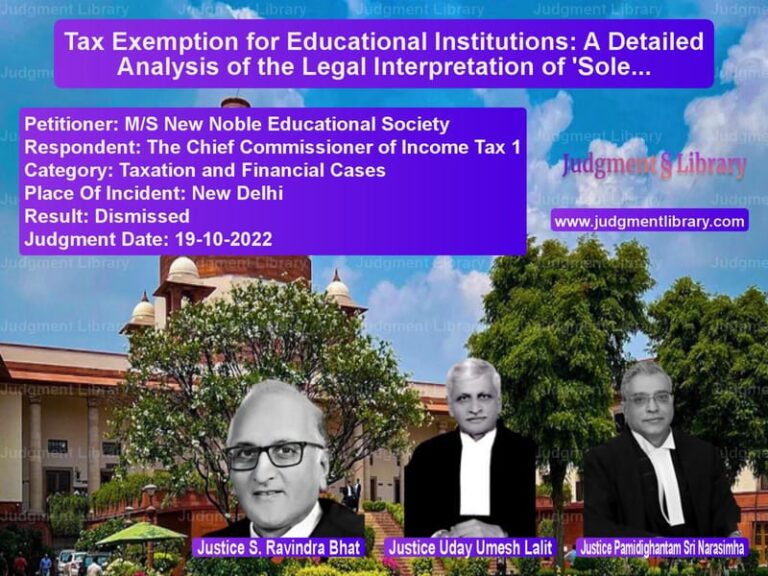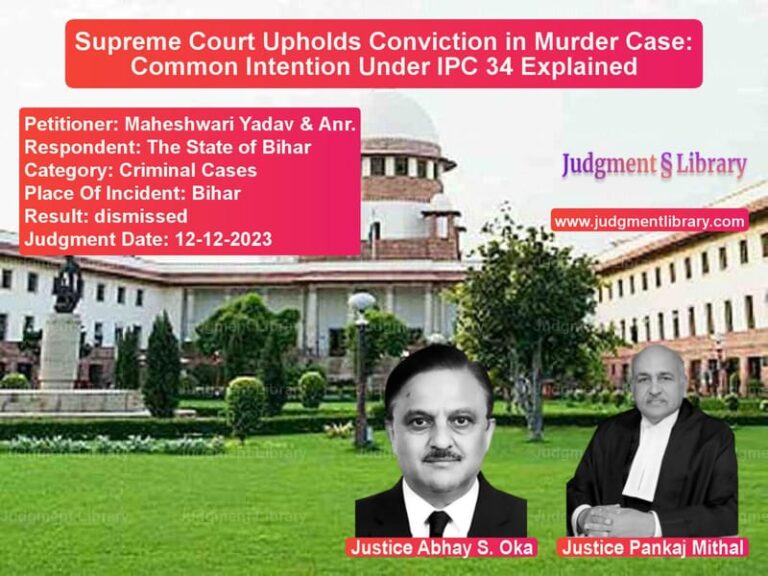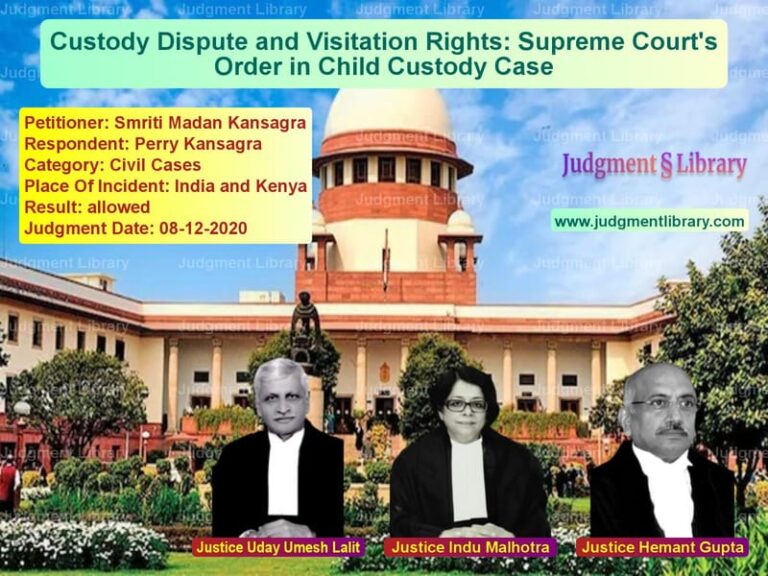Montecarlo Ltd. vs. NTPC Ltd.: Supreme Court Ruling on Tender Eligibility and Judicial Review
The case of Montecarlo Ltd. vs. NTPC Ltd. revolves around the crucial legal issues of tender eligibility, bid evaluation, and the extent to which courts can intervene in government contract decisions. The dispute arose over NTPC’s tendering process for coal mine development, wherein Montecarlo Ltd. was disqualified for not meeting the technical criteria. The Supreme Court was called upon to decide whether NTPC’s decision was arbitrary or within the permissible limits of its discretion.
Background of the Case
NTPC Ltd. issued separate invitations for bids for the development and operation of three coal mines—Dulanga Coal Block, Chatti Bariatu, and Talaipalli—in Odisha. The bids were invited on a Single-Stage Two-Envelope Bidding basis, with:
- Envelope-I: Techno-Commercial Bid
- Envelope-II: Price Bid
The bidding process included a Reverse Auction, wherein only eligible bidders who passed the technical stage could participate. The qualifying requirements (QR) were clearly outlined in Clause 5 of the Invitation for Bids (IFB), while Clause 6.3.1 of the Instructions to Bidders (ITB) specified that bids would be rejected if they had material deviations affecting the scope, quality, or performance of the contract.
Montecarlo Ltd.’s Disqualification
Montecarlo Ltd. submitted its bid but was later disqualified for failing to meet the technical qualification criteria under Clause 7.1.2 of the ITB. NTPC determined that Montecarlo’s bid was technically non-responsive because it did not demonstrate the required experience in drilling for blasting purposes. The decision was based on:
- The company’s experience in lignite mining instead of coal mining.
- A lack of documented proof that Montecarlo had performed drilling activities necessary for coal mining.
- Technical evaluation of the bid, which found deficiencies in compliance with tender requirements.
Montecarlo’s Arguments
Montecarlo Ltd. challenged its disqualification, arguing:
- The bid qualification criteria only required drilling experience, not necessarily for blasting.
- Their experience in lignite mining should have sufficed, as lignite and coal mining are similar in nature.
- NTPC’s interpretation of the tender requirements was overly restrictive and arbitrary.
- The bid rejection was based on technicalities rather than substantive non-compliance.
- Judicial review should be applied to correct NTPC’s allegedly unfair decision.
NTPC’s Counterarguments
NTPC defended its decision, asserting:
- The tender explicitly required coal mining experience, not just lignite mining.
- Drilling for blasting purposes was a key requirement for coal mining operations.
- Montecarlo’s supporting documents did not establish compliance with this requirement.
- Bid evaluation was done transparently by technical experts, and courts should not interfere.
High Court’s Ruling
The High Court ruled in favor of NTPC, holding that:
- Technical bid evaluation is within the discretion of the tendering authority.
- The bid rejection was reasonable and based on valid criteria.
- Judicial intervention in contractual matters should be minimal.
- NTPC’s decision served public interest by ensuring qualified bidders.
Supreme Court’s Judgment
The Supreme Court upheld the High Court’s ruling and dismissed Montecarlo’s appeal. Key points from the judgment include:
1. Limited Scope of Judicial Review
The Supreme Court reiterated that judicial review in tender matters is restricted. The court observed:
“The courts cannot sit in appeal over the financial and technical assessment of experts. It is neither ex facie erroneous nor can we perceive it as flawed for being perverse or absurd.”
2. Adherence to Tender Conditions
The court emphasized that tender conditions must be adhered to strictly. It held:
“A bidder cannot demand relaxation of terms after submitting the bid. The owner of the project is best suited to interpret its requirements.”
3. Owner’s Discretion in Evaluation
The court ruled that NTPC had full discretion to set and enforce eligibility criteria. It stated:
“The owner should be allowed free play in the joints. The decision-making process should not be subjected to interference unless it is mala fide or perverse.”
4. Distinction Between Lignite and Coal Mining
The judgment clarified that lignite and coal mining are distinct processes, and NTPC was justified in requiring specific coal mining experience. The court noted:
“Tender documents should be interpreted based on their plain language. A bidder cannot introduce qualifications that do not exist.”
Key Takeaways
- Judicial review in tender cases is limited: Courts should not second-guess technical evaluations unless there is clear evidence of arbitrariness.
- Tendering authorities have wide discretion: Public sector enterprises like NTPC can set and enforce eligibility criteria without interference.
- Strict adherence to bid conditions: Bidders must comply fully with tender requirements rather than seek post-bid relaxations.
- Transparency and expertise in bid evaluation: Tender processes should be handled by domain experts, with minimal judicial intervention.
Conclusion
The Supreme Court’s ruling reinforces the principle that courts must exercise restraint in reviewing government contract decisions. The judgment protects the autonomy of tendering authorities while ensuring fairness and transparency in bid evaluations. By upholding NTPC’s decision, the court has reaffirmed the importance of strict compliance with tender conditions to maintain the integrity of public procurement processes.
Don’t miss out on the full details! Download the complete judgment in PDF format below and gain valuable insights instantly!
Download Judgment: Montecarlo Ltd. vs NTPC Ltd. Supreme Court of India Judgment Dated 18-10-2016.pdf
Direct Downlaod Judgment: Direct downlaod this Judgment
See all petitions in Corporate Governance
See all petitions in Company Law
See all petitions in Contract Disputes
See all petitions in Judgment by Dipak Misra
See all petitions in Judgment by Uday Umesh Lalit
See all petitions in dismissed
See all petitions in supreme court of India judgments October 2016
See all petitions in 2016 judgments
See all posts in Corporate and Commercial Cases Category
See all allowed petitions in Corporate and Commercial Cases Category
See all Dismissed petitions in Corporate and Commercial Cases Category
See all partially allowed petitions in Corporate and Commercial Cases Category







